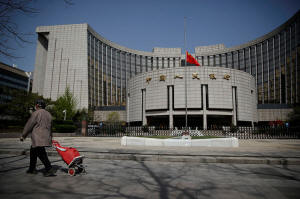China central bank surprises by lending again at lower rates
 Send a link to a friend
Send a link to a friend
 [July 25, 2024] SHANGHAI
(Reuters) - China's central bank surprised markets for a second time
this week by conducting an unscheduled lending operation on Thursday at
steeply lower rates, suggesting authorities are trying to provide
heavier monetary stimulus to prop up the economy. [July 25, 2024] SHANGHAI
(Reuters) - China's central bank surprised markets for a second time
this week by conducting an unscheduled lending operation on Thursday at
steeply lower rates, suggesting authorities are trying to provide
heavier monetary stimulus to prop up the economy.
The medium-term lending facility (MLF) operation comes after the central
bank cut several benchmark lending rates on Monday, just days after a
top leadership meeting, which had outlined other major reforms.
The People's Bank of China (PBOC) issued 200 billion yuan ($27.5
billion) in one-year loans under its MLF at 2.30%, down 20 basis points
from its previous MLF loan, the bank said in a statement.
The central bank also injected 235.1 billion yuan into markets through
seven-day reverse repos at 1.70% and said the cash injection through the
short-term instrument was to "maintain reasonably ample month-end
banking system liquidity conditions," according to the statement.
The MLF rate cut was "basically a reaction to the sharp declines in the
stock market," said Xing Zhaopeng, senior China strategist at ANZ.
China's benchmark indexes have been falling this week.

China's stock markets reacted negatively to the news on Thursday, taking
the sudden urgency on the part of authorities to lend to mean the
deflationary pressures and weakness in consumer demand are more severe
than what is priced into assets. China reported weaker-than-expected GDP
data earlier this month.
The Hang Seng China Enterprises index in Hong Kong, which tracks Chinese
firms listed in Hong Kong, fell 1.6%, taking losses this month alone to
5%. Sovereign bond yields fell after the news of the MLF operation and
rate cut.
Marco Sun, chief financial market analyst at MUFG Bank (China), said the
cut in the policy rates could reduce the cost of financing and release
cash. The unexpected MLF operation was also due to a large amount of MLF
loans coming due, he said.
Routine MLF loan operations take place in the middle of each month. The
PBOC's operations last week resulted in 3 billion yuan being withdrawn,
while leaving the interest rate unchanged.
Total outstanding MLF loans are above 7 trillion yuan, of which 4.68
trillion yuan are set to mature this year. The heavy amount of maturing
loans has stirred speculation the PBOC may replace it with a permanent
injection of cash via a cut to banks' reserve requirements (RRR).
[to top of second column] |

The Chinese national flag flies at half-mast at the headquarters of
the People's Bank of China, the central bank (PBOC), as China holds
a national mourning for those who died of the coronavirus disease
(COVID-19), on the Qingming tomb-sweeping festival in Beijing, China
April 4, 2020. REUTERS/Carlos Garcia Rawlins/File photo

ANZ's Xing said he expects the central bank to cut RRR in the fourth
quarter to replace outstanding MLF loans.
Some market analysts said Thursday's rate cut was also a reaction to
major lenders' decision to lower deposit rates.
The Industrial and Commercial Bank of China (ICBC), Agricultural
Bank of China (AgBank), China Construction Bank, Bank of China and
Bank of Communications cut deposit rates by 5 to 20 basis points
(bps), according to statements on their websites.
"It shows the PBOC wants to be more accommodating to banks in
lowering their medium-term funding costs," said Gary Ng, Asia
Pacific senior economist at Natixis.
"Cutting the MLF rate at a larger scale can help shield the net
interest margin."
The rate cuts also come ahead of a meeting of the Communist Party's
top decision-making body, or Politburo.
"In terms of the challenges facing the Chinese economy, rate cuts by
themselves, particularly of this magnitude, are not really going to
be that material," said ANZ's head of Asia research Khoon Goh.
"I think ultimately, given that the issues facing the property
sector, the lack of confidence that is holding back consumer
spending and confidence, all these need more concrete fiscal support
or other types of policy measures to address. Interest rate cuts by
themselves, particularly of the kind of magnitude we are seeing, are
not going to really be effective enough." ($1=7.2625 yuan)
(Reporting by Shanghai Newsroom; Additional reporting by Rae Wee and
Tom Westbrook in Singapore; Editing by Vidya Ranganathan and Neil
Fullick)
[© 2024 Thomson Reuters. All rights
reserved.]
This material may not be published,
broadcast, rewritten or redistributed.
Thompson Reuters is solely responsible for this content.
 |